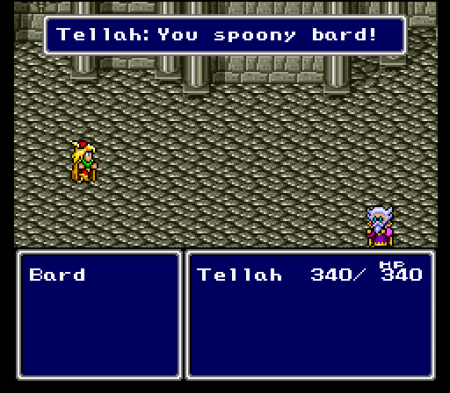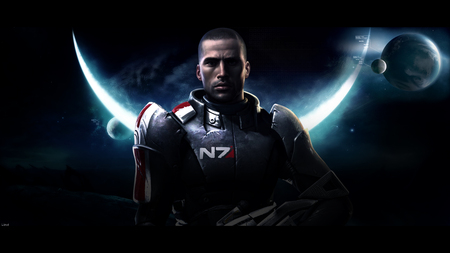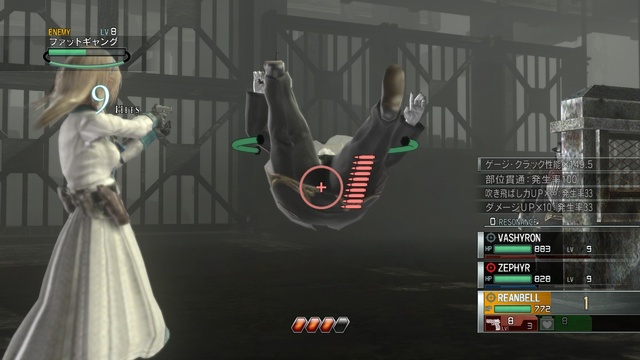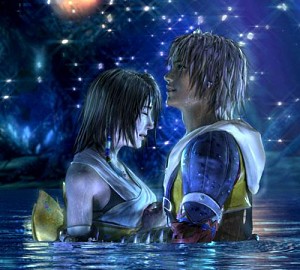Last updated on November 5, 2013
It’s difficult to imagine my life without JRPGs – both my love for video games and my development as a Christian stem from them.
Being a console gamer in my youth, there weren’t many choices for games other than platformer X or action game Y. That’s not to say that having Mario or Sonic as a constant companion was a bad thing – most games of that era took inspiration from their more advanced arcade counterparts, and retained their love of reflex-based challenge. However, sometimes you needed a breather from the intense focus of such games – or, perhaps, you desired something a little more from the standard.
Enter Final Fantasy II/IV. Cecil’s journey from dark to light was a revelation. I would call myself an avid reader, and these games OVERFLOWED with text. Certainly, they weren’t great localizations, but the world which Squaresoft created was amazing. Since I was inundated with the Bible at the same time, the parallels were obvious: every story in every medium were filled to the brim with redemptive overtones. I remember my mother telling me that The Nightmare Before Christmas was actually a story of a man being born again, and I think it actually works that way. Even Final Fantasy IV works brilliantly in that context – imagine, a dark knight must become a paladin, a warrior of light, to defeat the evils of the world. How grand, how metaphorical, and how true to Scripture. The act of reading, from my view, makes a game more interactive than it would be otherwise – it forces you to grapple with the text, create character voices, and bring life to what the developers could not with their limited translation skills and simple spritework.

JRPGs create worlds, subtly like our own, yet totally different. Who didn’t love deciphering the metaphysics of, say, Final Fantasy X’s complex chain of being? What’s an aeon, a Fayth, and all these new races? What are the physics of Besaid, and why can people hold their breath under water so long? Everything has an explanation if you choose to search for it – even Final Fantasy XIII has a Wikipedia database (although, really, that’s not the point of that game). The attention to detail Japanese developer put into the world’s aesthetic look, feel, and sound tries for a holistic blend, a transportation into another world – they work, more often than not. Subtle hints are laid out within the plot’s structure that reveal the true nature of events if you’re paying attention. I find many people do not pay attention to JRPG plots, assuming them to be totally nonsensical from the outset – that’s a problem with the player, not the game. I doubt many people care for the intricacies of said worlds, yet people still love the characters and their trials in the midst of a brand new world – clearly, there’s something beyond these mechanics that drive the games.
Honestly, I wasn’t too put off by the menu driven nature of what occurred in the game. It was an obvious placeholder for the graphical capabilities of the system. Plus, how would I control four to five characters at once without being overwhelmed? Squaresoft solved the problem in the form of the Active Time Battle System – combat is menu driven, but works in real time. Enemies did not wait for you to make a decision – they would attack you regardless. This added tension and much menu switching, searching for that one spell or ability that could bring you from the brink of defeat. Many bosses had great gimmicks that required a sense of timing – the Mist Dragon, for example, couldn’t be attacked in its Mist stance, or else it would counterattack for huge damage. Figuring out each battle and the most efficient methods to take down enemies was a complete joy. It creates a sense of strategy and tactics that I hadn’t experienced in a game before. Random battles heightened the tension – the enemy could strike at literally any moment. Preparation and supplies were key – how long is it to the next save point? When you’re running low on MP with no Ethers left, there’s no other genre that quite creates that cloud of dread as you desperately search for salvation.
The “RPG” elements involved numbers going up! But, contrary to what people seem to think as an unneccessary contrivance, seeing numbers go up provided a tangible measure of character growth. In the same vein, the characters in your party would grow and develop within the story, whether in a short vignette or a long term subplot. Most JRPGs have characters you would help for a time, they join the party, and then become mute for the rest of the game – trust me, this happened a lot. Still, you’d find a lot of variety. Everyone has their favorite characters in a JRPG, even if they don’t quite remember why or how they got into the party or whether they were interesting people, or even if they put too much of themselves into the character (Cloud Strife being a notable example of this). Character designs in JRPGs intentionally strike the player and remain instantly memorable. I can’t say the same for Commander Shepard.

Some believe these characters aren’t relatable, that they’re simple and don’t represent the problems of our world – well, duh, they take place in a different world. Yet, always, humanity encounters and endures the same problems: war, strife, conflict over limited resources. powers beyond imagining. In general, my mind characterizes these worlds as ones filled with sin, begging for redemption from the brink – it’s no surprise that you, the protagonist, are placed in a role to bring that redemption.
Magic could just as easily be seen as a metaphor for technological development and its destructive power. The characters in your party all have some motivation for being there, and many of them develop over time. Take Final Fantasy VII, for example – it has some of the most well-developed characters in the history of JRPGs. That’s why the game is still remembered today – Cloud’s story of self-identity and the search for greater meaning resonated with so many people. Cloud wasn’t a true person until he set upon his journey, and he became the better for it – even in the face of apocalypse, life is precious. Squaresoft, unfortunately, learned the wrong lessons from this, but I found Final Fantasy VII just as amazing today.
Even so, JRPGs matured. They gained new tools to tell their stories. Music became a primary component that set the mood and didn’t just ape the tropes of film scores. Characters could now look like those from a high-budget anime. The graphics enhanced the journey into a new world. Battle systems increased in their complexity and variety.
For whatever cultural reasons, the Japanese excel in innovation only in select areas – rather than innovate within systems as the Western iterative model, they innovate the whole structure of their game. How many JRPGs have you encountered with nonsensical battle system names like Battle Exalted Action Type System (Star Ocean 4, by the way)? Each of them take the same model (Hit points, magic, etc), yet take things in entirely bizarre and new direction. Some are simple, yet some are hilariously complex – I only need to point to Resonance of Fate/End of Eternity, which basically works entirely around its tri-Attack Battle system. I’ll admit they’re needlessly complex at times, but who doesn’t like trying to figure out the weird intricacies? Perhaps I am alone in my need for game contrivances splayed out across the screen, and JRPGs agree with me. “It’s ok to like this”, they say. Same goes for equipment, character development, and tinkering with all sorts of items both fun and useless. It’s a bit of kleptomania, sure, but I can do that in a game.

Most of all, JRPGs always held out for the promise of something more from video games. Granted, I find myself attracted to game that focus purely on game mechanics, but JRPGs were and are ambitious. They took a Western notion and turned it upside down, making their version more about the experience than the game. Early CRPGs, like Wizardry and Ultima, couldn’t replicate anything from the pen-and-paper Dungeons & Dragons style except mechanics. Although JRPGs rarely let you play as the protagonist, their excessive linearity turns many video game veterans away from the “perversion” of the genre. Fans of either haven’t gotten along in recent years – they talk past each other, neither understanding what is great about the other.
Sure, I’d say the term “role-playing game” doesn’t actually apply (seriously, it could apply to any video game), but typecasting a genre doesn’t help anyone. That they come from a different cultural milieu, and one I in which I have been immersed since childhood unintentionally, doesn’t remove an iota of their power. Like anime, they hold the power of a television show to develop characters over a long period of time. Over that span, you being to relate to these characters and understand them. It’s difficult to leave a world behind after it is all said and done, but everything was resolved and we must move on.
If JRPGs tend to tell the same story over and over again, it’s not merely because they’re out of ideas (clearly, that’s not the case, as there’s more variety than ever in the JRPG landscape). Rather, the story of deep personal and spiritual growth over a harrowing series of events always defines these games. Isn’t that our story, as well? In JRPGs, we can fix the problems of a broken world, a microcosm for the real one. We can find the motivation and strength in these characters and their battles, metaphysical, literal and metaphorical; we feel the tension of whether they can truly succeed in their goals. We invest meaning into their plight because we find ourselves in those daily battles. Like those characters, I know I need to put on the armor of God to withstand the trials of daily life and to change the world in God’s redemptive love.
10 Finally, be strong in the Lord and in the strength of His might. 11 Put on the full armor of God, so that you will be able to stand firm against the schemes of the devil. 12 For our struggle is not against flesh and blood, but against the rulers, against the powers, against the world forces of this darkness, against the spiritual forces of wickedness in the heavenly places. 13 Therefore, take up the full armor of God, so that you will be able to resist in the evil day, and having done everything, to stand firm. 14 Stand firm therefore, having girded your loins with truth, and having put on the breastplate of righteousness, 15 and having shod your feet with the preparation of the gospel of peace; 16 in addition to all, taking up the shield of faith with which you will be able to extinguish all the flaming arrows of the evil one. 17 And take the helmet of salvation, and the sword of the Spirit, which is the word of God.
And it is in that truth and that context that I say: I love JRPGs, for they tell simple stories with big meaning.

